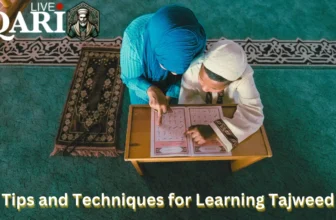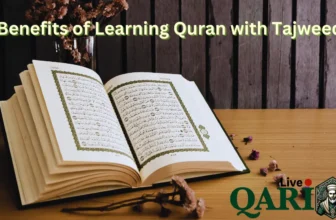
Arabic Language is renowned for its complexity, making it one of the most challenging languages globally. It stands apart from others due to its unique characteristics, such as multiple synonyms and meanings for each word. This complexity arises from the variations in short vowels, known as Al Harakat.
Harakat in Arabic Language
“Al Harakat” refers to diacritical marks used in the Arabic alphabet, also called “short vowels.” The singular form of “harakat” is “haraka.” Additionally, “Al” serves as a definite article, equivalent to “The” in English.
So, when we say “Al Harakat,” it is akin to saying “The short vowels.” Arabic harakat plays a vital role in teaching the tajweed rules of the Quran, enabling the correct enunciation and pronunciation of phrases.

What Do These ‘Harakat’ (حركات) Refer To?
In the Arabic language, ‘Al Harakat’ comprises four forms, each organized based on its level of influence on the letter, ranging from the strongest to the weakest. We will now introduce them to you in sequence.
1. Kasra (الكسرة):
The Kasra is represented under the letters as a very small symbol, like this ( ـِ ).
Arabic
Pronunciation
Arabic
English
Pronunciation
2. Damma (الضمة):
The Damma is represented by a lowercase ‘waw‘ (و) above the letter, like this ( ـُ ).
Arabic
Pronunciation
Arabic
English
Pronunciation
3. Fat-ha (الفتحة):
Considered one of the lightest harakat in Arabic, the Fat-ha is named so because it involves opening the mouth. It’s marked above letters in a small form like this: ( ـَ ).
Arabic
Pronunciation
Arabic
English
Pronunciation
4. Sukoon (سكون):
Sukoon stands in contrast to harakat. However, in grammar, Sukoon refers to the haraka placed above a letter.
Sukoon is represented above letters in a tiny circle, like this: ( ـْ ).
Arabic
Pronunciation
Arabic
English
Pronunciation
Note:
There are differing viewpoints regarding Sukoon. Some consider it a haraka, while others call it “The No Vowel.” In the past, Sukoon was represented by a small letter “khaa” without a dot above it, like this ( ـۡ ). This historical usage, especially in the Holy Qur’an, might be encountered in older Arabic language books, so it shouldn’t be surprising if you come across it.
The Significance of حركات in Arabic Language(Harakat Arabic)
To illustrate the significance of short vowels in the Arabic language, let’s consider two examples without Harakat:
حر (Har):
When asked to pronounce it, you’ll find two groups:
The first group pronounces it as “Hor” (حُرْ), meaning “free” in English, which is correct.
The second group differs and pronounces it as “Har” (حَرْ), meaning “hot” in English, and they are also correct.
علم (‘Ilm):
This example similarly divides opinions:
The first group pronounces it as ‘ilm (عِلْمْ), meaning “science” in English, which is accurate.
The second group pronounces it as Alam (عَلَمْ), which means “flag” in English, and they are also correct.
Notice the contradiction and significant difference in meaning when Harakat changes. From this, we understand the importance of Harakat:
- Harakat aid in proper pronunciation, enabling synonyms for the intended word.
- They convey the writer’s intended meaning with clarity in understanding.
- Harakat arabic is crucial in grammatical parsing (الإعراب “Al ‘ieraab“), as it depends on the Harakat of letters at the end of words.
Join now the Best Online Quran Tajweed Course at Qari.Live and Start your Online Quran Classes Today.
Short and Long Vowels: What Sets Them Apart
Many people wonder about the difference between short vowels and long vowels. It may seem like pronouncing “fat-ha” is similar to “alif,” “damma” to “waaw,” and “kasra” to the letter “yaa.” But there’s a crucial distinction.
Short Vowels
Long Vowels
Short Vowels
Long Vowels
Short Vowels
Long Vowels
This distinction helps in Arabic pronunciation and understanding word meanings.
Frequently Asked Questions (FAQ’s)
What is Harakat in Arabic?
حركات are symbols used in Arabic writing to show vowels, pronunciation, and emphasis. They help clarify word meanings.
How is Harakat used in Arabic calligraphy?
Harakat is incorporated artistically in Arabic calligraphy to enhance visual beauty and linguistic precision.
Is Haraka essential for learning Arabic?
They’re not essential for native speakers but greatly assist learners in pronunciation and comprehension.
What challenges do learners face with Haraka?
Learners may find them complex to memorize, and dialects may differ in usage.
How has technology impacted حركات usage?
Technology aids learners with pronunciation and recognition, making digital Arabic texts more accessible.
Conclusion
In Arabic, think of “حركات” as silent superheroes. They’re like secret codes in the form of tiny symbols that help us say words right and understand their meanings. They’re like the special sauce that makes Arabic beautiful and clear.
حركات is not just for scholars but for anyone learning Arabic. They’re like the training wheels on a bike, helping us correct the pronunciation and ensuring we understand what we’re saying.







